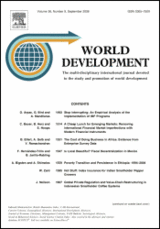Externe Publikationen

Productive effects of public works programs: what do we know? What should we know?
Gehrke, Esther / Renate HartwigExterne Publikationen (2018)
in: World Development 107 (July), 111-124
DOI: https://doi.org/10.1016/j.worlddev.2018.02.031
Information
Public Works (PW) programs are popular development interventions due to their potential ‘double dividend’ of transferring income to the poor while at the same time creating public infrastructure. However, PW programs are costly and demanding from an administrative perspective and it is not clear whether they are the most cost-effective intervention to reduce poverty. Therefore, an assessment of PW programs needs to understand which benefits and costs these programs entail relative to other interventions, and whether or not the extra cost can be outweighed by generating benefits over and above those of alternative interventions, such as Cash Transfer programs. This paper seeks to identify these benefits, and develops a conceptual framework that highlights four mechanisms through which PW programs could strengthen the productive capacity of poor households beyond the effects of Cash Transfers: productive investments, labor market effects, skills development, and increases in trade and production. It then reviews available empirical evidence from PW programs in developing countries. The results suggest that PW programs can induce productive investments via income and insurance effects when the program is sufficiently reliable and long-term. PW programs can also have positive welfare effects by raising wages, but potential adverse effects on labor markets have to be taken into account. Implicit or explicit training components of PW programs do not seem to increase the employability or business earnings of participants. Finally, there is only scant empirical evidence on the productive effects of the public infrastructure generated by PW programs, and further research is crucial to understand and quantify those effects. This paper concludes that PW programs are only preferable over alternative interventions if they generate substantial investments among the target group, if there is clear evidence that private-sector wages are below equilibrium wages, or if the public infrastructure generated in PW programs has substantial growth effects.
Kontakt
Cornelia Hornschild
Koordinatorin Publikationen
E-Mail Cornelia.Hornschild@idos-research.de
Telefon +49 (0)228 94927-135
Fax +49 (0)228 94927-130
Alexandra Fante
Bibliothekarin/Open Access-Koordinatorin
E-Mail Alexandra.Fante@idos-research.de
Telefon +49 (0)228 94927-321
Fax +49 (0)228 94927-130


